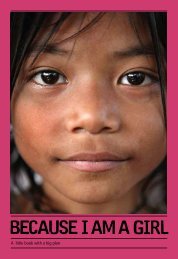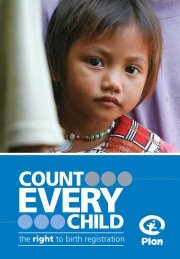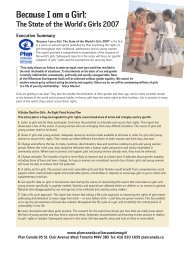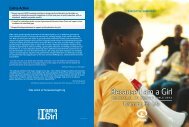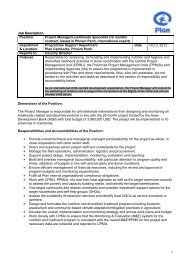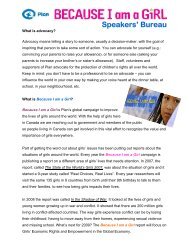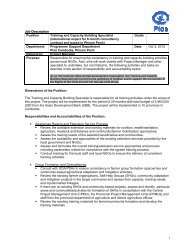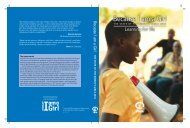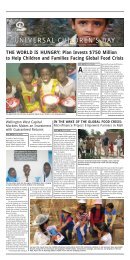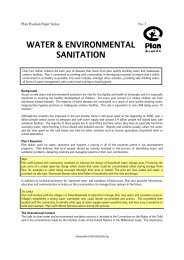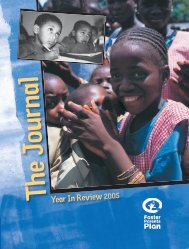Plan Worldwide Annual Review and Combined Financial ...
Plan Worldwide Annual Review and Combined Financial ...
Plan Worldwide Annual Review and Combined Financial ...
Create successful ePaper yourself
Turn your PDF publications into a flip-book with our unique Google optimized e-Paper software.
9b Income<br />
<strong>Plan</strong> mainly raises funds in Europe, the Americas <strong>and</strong> the Asia-Pacific region. Income in both 2011 <strong>and</strong> 2012 was impacted by favourable<br />
exchange rates movements compared to the Euro in most fundraising markets.<br />
57% of <strong>Plan</strong>’s income is derived from regular giving through child sponsorship, which increased by 3% to €363 million in the year due to<br />
the effects of currency appreciation against the Euro <strong>and</strong> a small underlying increase. Underlying child sponsorship income increased in some<br />
markets, with particularly strong growth in Canada, Germany, Korea <strong>and</strong> Norway <strong>and</strong> also in Hong Kong which commenced operations in<br />
2009. These offset decreases in Netherl<strong>and</strong>s <strong>and</strong> Sweden. The growth in sponsorship income reflects successful marketing programmes<br />
<strong>and</strong> is encouraging given the current weak economic environment.<br />
Grants income grew by €14 million to €153 million in the year. 2012 included total income of €7 million from the Global Fund compared<br />
to €26 million in 2011. This income reflects the timing of projects <strong>and</strong> covers new malaria prevention programmes in Liberia <strong>and</strong> Senegal,<br />
in addition to the programmes in Togo, Burkina Faso <strong>and</strong> Cameroon that started in 2011, as well as the continuing HIV prevention <strong>and</strong><br />
support project in Benin. The decrease in Global Fund income was more than offset by higher grant income in most geographies, especially<br />
in Netherl<strong>and</strong>s <strong>and</strong> Sweden (both of which benefited from new framework agreements) <strong>and</strong> in Australia, Canada, Germany <strong>and</strong> Colombia.<br />
Gifts in kind totalled €27 million in 2012 compared with €15 million in 2011. Gifts in kind included food aid from the World Food Programme for<br />
Zimbabwe, Rw<strong>and</strong>a, Niger, Sierra Leone <strong>and</strong> El Salvador in both 2012 <strong>and</strong> 2011 <strong>and</strong> in 2012 also for Cambodia, Pakistan, Philippines <strong>and</strong> South<br />
Sudan. Gifts in kind also included medicines for various countries, principally El Salvador in 2012 <strong>and</strong> Pakistan in 2011, <strong>and</strong> pro bono consultancy<br />
for the business operating model reform programme required to implement the Global Strategy.<br />
Other contributions, including disaster <strong>and</strong> other appeals, increased by €7 million to €85 million in the year. The growth came from successfully<br />
targeted marketing, especially in Australia, Canada <strong>and</strong> Sweden, whilst in Japan other contributions have decreased as donors reprioritise their<br />
support following the tsunami in 2011. Investment income remained at almost €3 million, as higher interest income offset lower gains on sales<br />
of investments. Trading income of €3 million was less than 2011.<br />
9c Expenditure<br />
Total <strong>Plan</strong> <strong>Worldwide</strong> expenditure before foreign exchange gains <strong>and</strong> losses increased by €90 million compared to 2011, to €634 million.<br />
Total programme expenditure was €488 million in the year to 30 June 2012, which was an increase of €70 million or 17% over 2011.<br />
This represents all costs directly related to delivering programmes including field staff <strong>and</strong> associated office <strong>and</strong> equipment spend, the cost<br />
of facilitating communications between sponsored children <strong>and</strong> sponsors <strong>and</strong> activities to raise awareness of development issues.<br />
The regional profile of expenditure in 2012 is relatively unchanged compared to 2011. Africa continues to be the region accounting for most<br />
expenditure, representing 34% of total expenditure excluding net gains on foreign exchange, compared to 31% in 2011. Expenditure in Asia<br />
represented 22% of total expenditure in 2012 compared to 24% in 2011. Central <strong>and</strong> South America accounted for 15% of total expenditure<br />
excluding net gains on foreign exchange, compared to 19% the previous year, as expenditure in Haiti reduced following the earthquake in 2010.<br />
The balance was in Europe <strong>and</strong> North America.<br />
Programme expenditure in Africa of €216 million represents 44% of total programme expenditure. Expenditure in Asia was €109 million or<br />
22% of programme expenditure <strong>and</strong> a further 19% of expenditure or €92 million was applied to programmes in Central <strong>and</strong> South America.<br />
Field programme expenditure also includes Interact worldwide expenditure which accounted for €4 million spend in 2012 <strong>and</strong> €3 million in 2011.<br />
The remaining €67 million of programme expenditure is in <strong>Plan</strong> donor countries <strong>and</strong> the International Headquarters.<br />
Expenditure is categorised into the distinct areas in which <strong>Plan</strong> works in accordance with <strong>Plan</strong>’s programme framework as implemented in 2010.<br />
Expenditure on a Healthy start in life, which covers support to primary health care programmes, pre school infrastructure <strong>and</strong> the Universal Birth<br />
Registration campaign, increased by 37% compared to the prior year. This is the programme area with the highest expenditure at €97 million<br />
in 2012 or 20% of total programme expenditure. Half of the increase was due to the timing of malaria prevention activities that were funded<br />
by grants from The Global Fund in Burkina Faso, Cameroon, Liberia, Senegal <strong>and</strong> Togo. Expenditure in 2012 in Togo included the distribution<br />
of malaria nets that were received in 2011 but their distribution was delayed pending availability of all nets for other Global Fund partners.<br />
Expenditure increased in Sierra Leone for food aid targeted at programmes for school <strong>and</strong> under five’s feeding <strong>and</strong> in Bolivia, El Salvador,<br />
Kenya <strong>and</strong> Tanzania due to wider coverage by <strong>Plan</strong>.<br />
<strong>Plan</strong> International <strong>Worldwide</strong> <strong>Combined</strong> <strong>Financial</strong> Statements for the year ended 30 June 2012<br />
7



